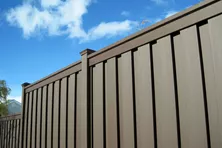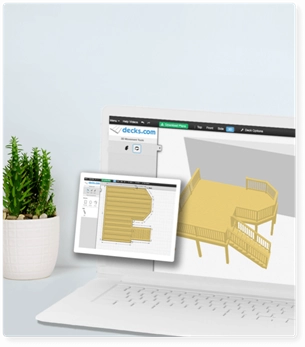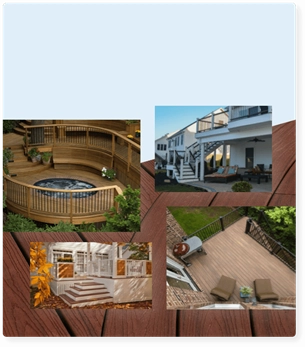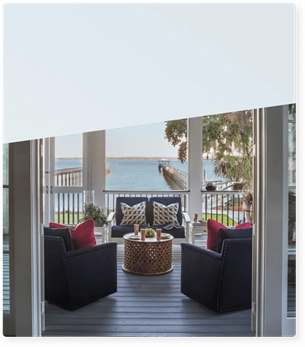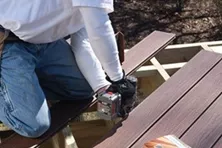Hanging String Lights on a Deck
Draped along a wall or hung for a curtain effect, a few well-placed string lights can provide both practical benefits and style. And since you don’t need any pre-existing structures for these types of hanging deck lights, this project can be quick, easy, and relatively inexpensive. While it can be a simple process, you’ll still need to take a moment to plan, prepare, and learn a few of the finer points about how to string lights over a deck, determining how you want to hang or drape them, and making sure you have everything you need.
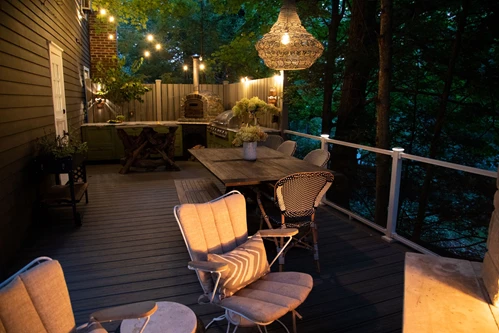
Materials You’ll Need
Even if you’re a total amateur, hanging outdoor lights on deck is a fairly easy project. With a little preparation, you can successfully hang string lights within an hour. The cost of materials can vary somewhat depending on type, quantity and brand, but as long as you don’t need to purchase any tools, the entire project should be in the neighborhood of $50-$80.
You’ll need:
- Furring Stripboard (2” x 2” x 8’)
- Galvanized Wood Screws
- Cup Hooks (1-1/4" or similar)
- Pliers (Optional)
- Electric Drill
- Carpenter's Level
- Outdoor String Lights
- Paint or Stain (Optional)
In order to determine how many string lights that you’ll need, take a moment to measure out the total distance you need to cover. Keep in mind stylistic choices when determining the length of strings needed. For instance, if you plan to pull your string lights taut across a specified area, you won’t need as long a string of lights as you would if you chose to drape your light strings. If you plan to opt for more of a draped effect, you’ll want to purchase extra length to give you the slack needed to achieve your desired look.
To determine how many stripboards and cup hooks you’ll need, plan the layout of your lighting in advance. Try to select furring strips that are designed to match or accent your deck. If you can’t find pre-matched strips, you can paint or stain them.
How to Hang String Lights On Your Deck
Hanging string lights on a deck typically is not a complicated process. However, things can become more difficult if you don’t follow each step in the correct order:
Determine how many posts are needed
Outside of deck railing, posts serve as the primary location for your hanging hooks. The number you need will depend on the amount of lights you want to run, and the direction you want to run them. The simplest setup can use as few as two poles. Depending on your lights and their location, you can typically anticipate needing a new pole every 7-10 feet.
Paint or stain the posts to match the deck
Learning how to hang lights on deck without running into any problems is mostly about preparation. If you’ve managed to find posts that already match the color and style of your deck, you can skip this step. Otherwise, you’ll want to stain or paint your posts before installing them, and give them a full day to dry before moving onto the next step. Staining posts after they’ve been installed on your deck is also an option, but it means you’ll need to be careful about protecting the rest of your deck from drips and runoff.
Dip Hooks In Liquid Plastic
The hooks you purchase will undoubtedly be electroplated galvanized metal. It’s not a good idea for the energized wires of the string lights to come into contact with metal. To keep this from happening, purchase a small can of liquid plastic and dip the hook end of the hooks into the plastic and allow them to dry and cure for 48 hours. Be careful not to allow any liquid plastic to get onto the hook threads.
Screw a hook into the top of each post
Drill a pilot hole into the top of your first post; the diameter of the hole should be smaller than the diameter of the hook you intend to install. Once the pilot hole is complete, manually twist the hook into position until you have it firmly started into the post. From here, you can either use pliers to manually turn the hook into the post, or an electric drill with an eye bolt looped over the hook. Be very careful that you don’t remove any of the liquid plastic coating you applied. If you mar the plastic coating, touch it up once the hooks are in place.
Attach the posts to the railing at the corners of the deck
Proper post placement is one of the key factors to successfully hanging string lights on your deck. When configuring your post placement, it’s important to note their relation to other elements on your deck that will carry lights. With placement decided, use a level to check each post before driving your screws, then drill at least one wood screw into the base. In addition to using a screw at the base of the post, connecting posts to railing at the edges of your deck provides a second point of anchorage, and an overall more secure build.
Hang the lights from each post
Starting closest to your power source, begin running your first string of lights along their intended route. If you’re not using posts and, instead, are hanging string lights from your deck railing, staples can be a viable alternative if you don’t want to connect cup hooks to the underside of your railing. Should you decide to secure the lights with staples, be extremely careful that the staples don’t cut or pinch the energized wires of the string lights.
It’s not always necessary to secure string lights to your hooks, but adding a few zip-ties can help to ensure you don’t have to worry about the wind. If you find yourself with excess lighting by the end, you can either allow it to trail downward in a stylish way, or it can be disabled.
Plug Lights into a GFCI
Be sure your string lights are plugged into a ground-fault circuit interrupter (GFCI) 120-volt outlet. This assumes the string lights you’re using are 120 volts AC. It will say this on the label of the lights.
You can sometimes get string lights that are powered by a battery that’s charged with a solar panel. This might be a green choice, but it’s possible the lights could go dark before your party ends. Be sure to check to see how long the fully charged battery will power the lights.
Get More Deck Design Ideas
Learning how to string lights on a deck is a simple, DIY project that can add a stylish touch to your outdoor space. Deck lighting, landscaping, and arranging deck furniture in certain ways can create a unique vibe of your own creation -- and help you make the most of your backyard no matter how large or small it may be. Get more inspiration for designing a deck and creating an atmosphere that suits your style by clicking the links below:
Decking Patterns
Step into the world of deck design and push the limits of your imagination with our collection of deck patterns and ideas. From classic single-width and diagonal layouts to intricate herringbone and chevron designs, we illustrate the wide range of patterns that will unlock your creativity.
10 Fence Ideas to Add Privacy and Style to Your Yard
10 Fence Ideas to Add Privacy and Style to Your Yard
Best House and Deck Color Combinations
Whether you’re adding a deck to your home, repainting your deck, or refreshing the exterior of your home, it’s important to consider all the different design choices you have available to you, so you can choose one that makes your neighbors do a double take (in a good way!)
IRC Code Requirements For Decks
Residential properties have certain code requirements that must be met before building a deck known as the IRC. Learn more about IRC building codes for decks at Decks.com!
Contractor Problems? How to Communicate with Contractors and Handle Disputes
When working on a large construction project, there are bound to be bumps in the road. Learn how to handle disputes with a contractor with Decks.com.
Residential PSF Deck Requirements
For a residential deck, the code requires it be designed to support a minimum 40-psf live load. Learn more about how much to put on a deck psf at Decks.com.
More Helpful Resources
Explore Articles by Topic

Footings
Information related to installing frost footings for decks
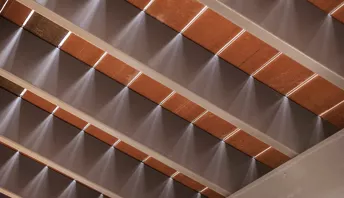
Framing
Learn structural framing methods
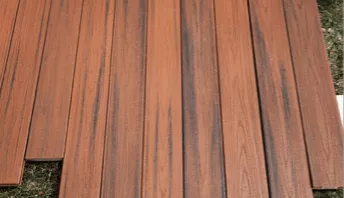
Decking
Learn about wood and composite decking materials
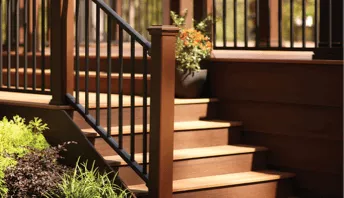
Stairs
An in-depth look at the complex issue of how to build stairs
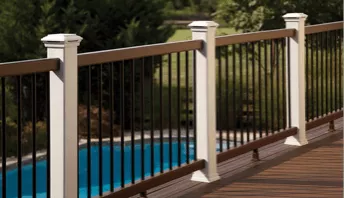
Railings
How to install guardrails and handrails to meet IRC code
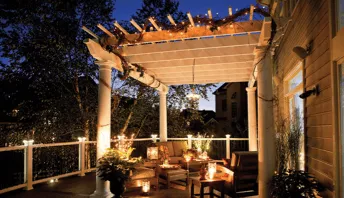
Features
An overview on water drainage, benches, planters and lights
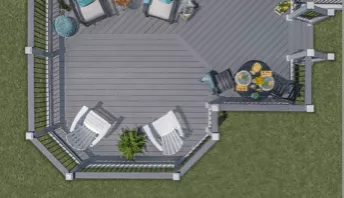
Design
The basics of deck design
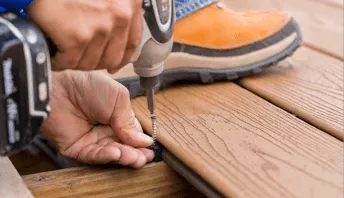
Planning
Learn about permits and working with contractors
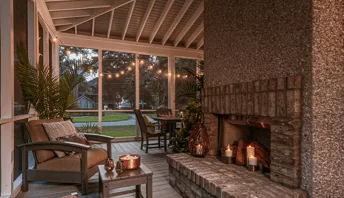
Porches & Patios
Build a covered deck to enjoy all seasons
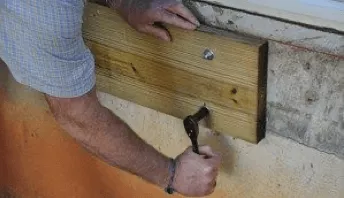
Ledger
Proper attachment techniques
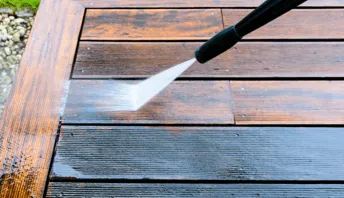
Care
Maintain your deck to maintain your investment

Materials
An overview on water drainage, benches, planters and lights
Pool Deck Ideas on a Budget
A stylish poolside retreat doesn't have to come with an over-the-top price tag. Allow us to show you some easy and innovative ways to build a stunning pool deck that won't empty your wallet.
Decking Patterns
Step into the world of deck design and push the limits of your imagination with our collection of deck patterns and ideas. From classic single-width and diagonal layouts to intricate herringbone and chevron designs, we illustrate the wide range of patterns that will unlock your creativity.
The Best Deck Styles for Every Part of the Country
Deck taste and styles in the US differ across the country. Check out these popular looks from every region.
How to Grade Your Yard
Master the art of yard grading! From choosing the right slope to understanding the costs, this guide covers everything you need to achieve a properly graded yard that protects your home and enhances your landscape.
Residential PSF Deck Requirements
For a residential deck, the code requires it be designed to support a minimum 40-psf live load. Learn more about how much to put on a deck psf at Decks.com.
Questions To Ask Your Deck Contractor
The quest to find the right contractor to complete your decking project can feel overwhelming and stressful. Learn more about what questions you should ask before hiring a contractor on decks.com
Explore Articles by Topic

Footings
Information related to installing frost footings for decks

Framing
Learn structural framing methods

Decking
Learn about wood and composite decking materials

Stairs
An in-depth look at the complex issue of how to build stairs

Railings
How to install guardrails and handrails to meet IRC code

Features
An overview on water drainage, benches, planters and lights

Design
The basics of deck design

Planning
Learn about permits and working with contractors

Porches & Patios
Build a covered deck to enjoy all seasons

Ledger
Proper attachment techniques

Care
Maintain your deck to maintain your investment

Materials
An overview on water drainage, benches, planters and lights





